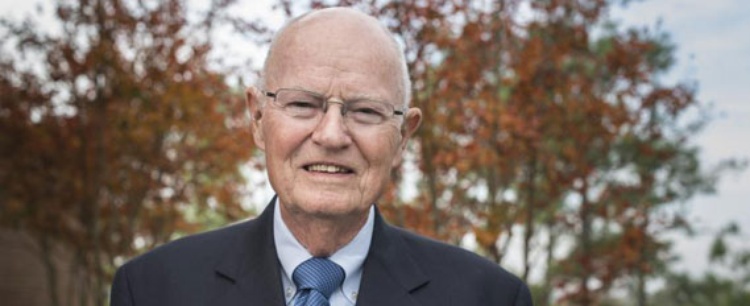Thursday, June 2, Robertson McQuilkin went to be with Jesus at 88 years old. I wrote about Robertson in my book If God Is Good, sharing how at the peak of his career, he resigned as president of Columbia Bible College in 1990 to become the full-time caregiver for his wife, Muriel, who had Alzheimer’s. Robertson did this, he said, because Muriel was much happier when he was with her.
Writing for Christianity Today in his article “Living by Vows,” he shared about the time before his resignation:
The board arranged for a companion to stay in our home so I could go daily to the office. During those two years it became increasingly difficult to keep Muriel home. As soon as I left, she would take out after me. With me, she was content; without me, she was distressed, sometimes terror stricken. The walk to school is a mile round trip. She would make that trip as many as ten times a day. Sometimes at night, when I helped her undress, I found bloody feet. When I told our family doctor, he choked up. “Such love,” he said simply. Then, after a moment, “I have a theory that the characteristics developed across the years come out at times like these.” I wish I loved God like that—desperate to be near him at all times. Thus she teaches me, day by day.
I remember listening years ago to McQuilkin’s announcement of his retirement from being president of Columbia Bible College to care for Muriel. Here’s the audio with some pictures. I find it very touching and Christ-honoring.
Years later in a radio interview, Dennis Rainey asked if he had any regrets about the transition from college president to caregiver. McQuilkin said,
I never think about “what if.” I don’t think “what if” is in God’s vocabulary. So I don’t even think about what I might be doing instead of changing her diaper or what I might be doing instead of spending two hours feeding her. It’s the grace of God, I’m sure.
Rainey asked a follow-up question: “But do you ever think about what you may have given up to care for her?” McQuilkin responded,
I don’t feel like I’ve given anything up. Our life is not the way we plot it or plan it.... All along I’ve just accepted whatever assignment the Lord gave me. This was his assignment. I know I’m not supposed to have that kind of reaction, but you asked me, and I have to be honest. I never went to a support group. I had enough of my own burdens without taking on everybody else’s. Sometimes I have accepted an invitation to speak at one of these. A lot of angry people. They’re angry at God for letting this happen—“Why me?” They’re angry at the one they care for, and then they feel guilty about it because they can’t explain why they’re angry at them.... I say, in acceptance there’s peace.
(You can listen to Robertson’s 4-part interview.)
He wrote in his article “Living by Vows” about his care for Muriel:
People who do not know me well have said, “Well, you always said, ‘God first, family second, ministry third.’” But I never said that. To put God first means that all other responsibilities he gives are first, too. Sorting out responsibilities that seem to conflict, however, is tricky business.
…It is not like meeting a $10 million budget or designing a program to grasp some emerging global opportunity, to be sure. And it is not as public or exhilarating. But it demands greater resources than I could have imagined, and thus highlights more clearly than ever my own inadequacies, as well as provides constant opportunity to draw on our Lord's vast reservoir of resources.
…When the time came, the decision was firm. It took no great calculation. It was a matter of integrity. Had I not promised, 42 years before, “in sickness and in health . . . till death do us part”? This was no grim duty to which I stoically resigned, however. It was only fair. She had, after all, cared for me for almost four decades with marvelous devotion; now it was my turn. And such a partner she was! If I took care of her for 40 years, I would never be out of her debt.
Reflecting on the attention given to his resignation, Robertson said:
I have been startled by the response to the announcement of my resignation. Husbands and wives renew marriage vows, pastors tell the story to their congregations. It was a mystery to me, until a distinguished oncologist, who lives constantly with dying people, told me, “Almost all women stand by their men; very few men stand by their women.” Perhaps people sensed this contemporary tragedy and somehow were helped by a simple choice I considered the only option.
Thank you, Robertson, for your example of faithful love to your wife and above all to our Savior. And thank you, Jesus, for raising up your people who leave footsteps for us to follow.




